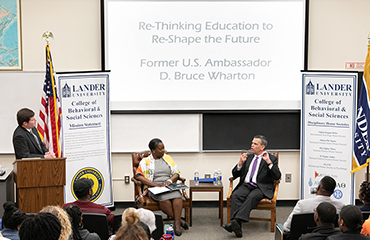
Former U.S. ambassador Bruce Wharton and Lois Mufuka Martin, a trustee with the Mufuka Foundation, visited Lander University on Tuesday, April 23.
While on campus, Wharton spoke to a luncheon crowd of Lander and community leaders, guest-lectured in an upper-level history course about the Cold War, and provided a lecture titled "Re-Thinking Education to Re-Shape the Future." Afterwards, he and Martin took part in a discussion about the power of education.
The Lander Foundation and the College of Behavioral & Social Sciences coordinated their campus visit.
"Ambassador Wharton served the nation as a career diplomat and is a proponent and advocate for international understanding and education both at home and abroad," said Dr. Lucas McMillan, dean of Lander's College of Behavioral & Social Sciences. "Mrs. Martin is a Lander history alumna with over 20 years of experience as a non-profit executive and community change agent. She has a passion for history, and carries it forward into the policy-making world."
During his 32-year career as a Foreign Service Officer, Wharton was posted in U.S. embassies in Latin America and Africa. He rose through the ranks to serve as U.S. Ambassador to Zimbabwe, as well as sub-cabinet level positions within the U.S. State Department's bureaus of African Affairs and Public Affairs. His work in public diplomacy allowed him to speak to students about the promotion of U.S. values as a part of American foreign policy.
While speaking with Lander students, Wharton said, "I believe strongly in the power of education to lift communities and the world. I never stop learning. I try to pay as much attention as possible everywhere I am because there's usually something amazing going on that I can learn from."
While talking about what should be expected from our educational system, Wharton said, "Even though I believe our high schools and universities have made progress over the years, I have concerns there's too much emphasis on specific, narrowly defined skills, and not enough on comparative analysis and the importance of history, culture, art and critical thought. We need to do more to promote the joy of learning. While skilled workers, business people and doctors will always be needed, what makes people really successful is their ability to solve problems and develop new ways of working together."
Martin, who serves as scholarship coordinator with the Douglas and Jean Mufuka Foundation, has helped students from Zimbabwe to succeed at Lander. She spoke of the importance of transferable skills -- capabilities that are relevant and helpful across different areas of life. "The purpose of a liberal arts education is the development of transferable skills so that you can fill in the gaps in terms of solving problems," she said.